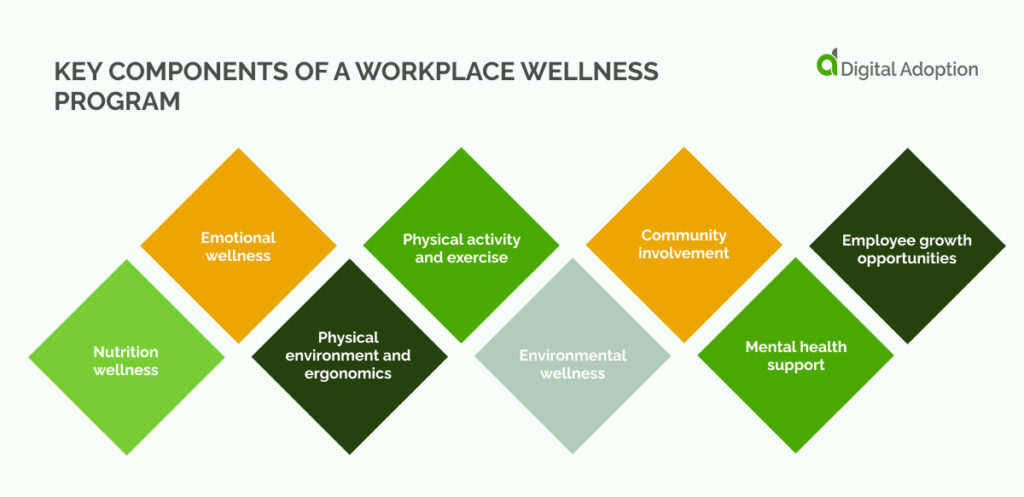Getting The Corporate Wellness To Work
Getting The Corporate Wellness To Work
Blog Article
Getting My Corporate Wellness To Work
Table of ContentsThe 8-Minute Rule for Corporate Wellness9 Easy Facts About Corporate Wellness ShownMore About Corporate WellnessRumored Buzz on Corporate WellnessFacts About Corporate Wellness Revealed

Team Challenges: Wellness 360 offers interesting team-based challenges that inspire workers. Data-Driven Decisions: considerable coverage and data analysis tools much better notify your choices about staff member health. Contact the firm to learn more about strategies and pricing choices. 4.9/ 5 WolibaOpens a brand-new window is an adjustable system that puts employees in the motorist's seat of their wellness trip.

More About Corporate Wellness
Call the business to discover strategies and prices options. 4.3/ 5 In today's vibrant workplace, prioritizing employee well-being is no more a luxury; it's a need. These systems supply features that address physical and psychological health and wellness demands, from customized mentoring and gamified difficulties to data-driven insights and seamless benefit navigation.
Studies from Gallup program that business with strong wellbeing initiatives report an 81% decline in absenteeism, 18% greater efficiency, and 23% better earnings. Here's why concentrating on employee wellness is smart organization: A helpful workplace that values worker well-being promotes commitment and reduces turnover. Workers are most likely to remain with a business that sustains their health and individual lives.
Guarantee workers have accessibility to mental wellness professionals with Staff member Assistance Programs (EAPs). Staff members grow in environments where they really feel linked, supported, and component of a neighborhood.
Arrange joint exercises, hideaways, or get-togethers to boost partnerships. Set workers with mentors to promote expert development and a feeling of belonging. Motivate responses and develop spaces for significant conversations between workers and leadership.: Financial anxiety can threaten both mental and physical wellness, leading to reduced emphasis and performance at job.
Not known Facts About Corporate Wellness
Motivate employees to set boundaries, such as not reacting to e-mails outside work hours. Limited adaptability in job arrangements, such as requiring on-site work, can include unnecessary stress and anxiety and limitation staff members' capability to take care of personal commitments.
Mentorship programs sustain employee advancement and improve the worker experience. Leaders should promote inclusivity by modeling compassion and focusing on worker wellbeing.
Regularly evaluate the data to examine progression toward your goals. : Look for patterns in absenteeism or turn over that could show areas for renovation. Contrast survey results over time to track changes in complete satisfaction and engagement. Use understandings from your click reference metrics to improve your well-being efforts: If absence remains high, consider presenting even more targeted health and wellness programs or reviewing workload monitoring.
Investing in worker well-being advantages both the workforce and the company. By creating a helpful environment, companies can motivate staff members to be much more engaged, resilient, and motivated.
All about Corporate Wellness
Today, several companies do not see or can not determine the benefits of their current financial investments in staff member wellness. They likewise don't allocate sources in one of the most efficient wayoften, the issue is not how much is being spent yet find out this here the kind of investment being made. Instead of only resolving the bad health and wellness of individual workers, creating a healthy workforce indicates taking a profile method: dealing with illness and promoting health, supporting people, and producing much healthier teams, work, and organizational atmospheres.
The choice to demand a healthy office is one every staff member and capitalist can make. Health is "even more than the lack of disease or imperfection," as the Globe Health Company (WHO) puts it.
A number of patterns are difficult to neglect: more people working than ever before, an aging populace living and working much longer, and intensifying degrees of fatigue. The current state of the workforce, coupled with these patterns, demands a rethink of staff member health and wellness to stay clear of a potential dilemma for health and organization. A healthy and a knockout post balanced workforce is not simply an issue of company and social obligation; it is a calculated requirement and a considerable organization opportunity.
The Buzz on Corporate Wellness

This rundown explains why purchasing labor force health can boost organizational performance, enhance staff member end results, and supply a significant roi. The globe is altering. Corporate Wellness. Individuals are living and working much longer, and their roles are evolving due to changes in population density, advancements in modern technology, globalization, and geopolitical and climate risks
Report this page